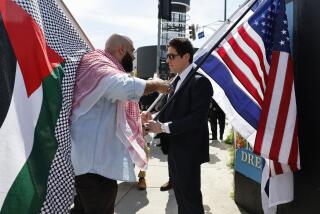Syria opposition forms new coalition
BEIRUT — The deeply divided Syrian opposition took a step toward renewed unity Sunday, forming a new coalition designed to build stronger international support for its goal of ousting the government of Syrian President Bashar Assad.
After more than a week of sometimes contentious discussions in the Qatari capital, Doha, Syrian dissidents said they had come together and formed an alliance with an unwieldy title: the Syrian National Coalition for Opposition and Revolutionary Forces.
Activists called it a broad-based coalition representing the diverse Syrian opposition, including members both inside and outside the country as well as various religious and ethnic minorities.
The United States and other governments backing Assad’s ouster have been pressing opposition groups to work in a unified fashion with both domestic and foreign allies.
Dissidents elected a Sunni Muslim cleric, Moaz Khatib, as the coalition’s president. Khatib was described as a moderate former preacher at the historic Umayyad mosque in Damascus, the capital, who fled the country during the summer after he was arrested. He is said to retain a considerable following inside Syria.
“We need to stop the bloodshed and we need to work in order to get rid of this regime and to build a free and just and fair society in Syria,” Khatib told the assembled delegates.
The fact that Khatib lived until recently in Syria distinguishes him from opposition figures who have lived outside the country for decades.
A pair of well-known dissidents, Riad Seif and Suhair Atassi — like Khatib, both formerly jailed by the Syrian government — were elected vice presidents of the coalition.
Initial reaction to the shake-up seemed positive. The election of Khatib “managed to return hope and confidence for many frustrated Syrians,” one activist from the northern city of Aleppo wrote on a social media site.
The new alliance is meant to serve as a kind of government in exile, helping to funnel international aid, organize rebel forces and build up international support for the rebel cause.
The group vowed not to negotiate with Assad, demanding that he relinquish power or face ouster. That has been the unyielding position of much of the Syrian opposition. However, the Syrian government and its allies, including Russia, have said talks are the only way to end the bloodshed.
It remains to be seen whether the new coalition will be any more effective than its predecessors. One challenge will be to avoid the kind of factional infighting that beset the Syrian National Council, until now the best-known opposition bloc. The council was formed a year ago amid great optimism, but enthusiasm soon dimmed.
Critics called the council out of touch with events in Syria, beset by internal squabbling, prone to lavish spending in five-star hotels and dominated by the Muslim Brotherhood, the Islamist group that covets a major role in a post-Assad Syria. Detractors have called for more voices from Syrian minority groups, including Christians and Kurds, and from people still living in Syria.
Late last month, Secretary of State Hillary Rodham Clinton declared that the Syrian National Council “can no longer be viewed as the visible leader of the opposition.”
In the end, the council remains a crucial bloc in the new coalition, controlling 22 of the 60 seats.
Opposition activists are hopeful that the new structure will help facilitate the supply of heavy weapons to Syria’s disparate rebel forces, and possibly help persuade Western governments to deploy air power to protect rebel-held areas in Syria.
The U.S., however, has said it has no intention of providing lethal aid to the Syrian opposition. Some fear that such weaponry could fall into the hands of Al Qaeda sympathizers, who are among the fragmented rebel forces in Syria.
Several Arab states, including Qatar, Saudi Arabia and Libya, have reportedly already facilitated arms transfers to the Syrian opposition. Gulf nations are also said to have helped bankroll the rebellion, providing funds for fighters’ salaries and channeling money to anti-Assad factions.
One goal of the new opposition coalition is to help impose a central command structure for the dozens of anti-Assad militias fighting in Syria. However, many rebel units reject leadership from outside and respond only to their commanders.
Inside Syria, Assad maintains considerable support, despite an almost 20-month rebellion that has killed thousands and left broad swaths of territory beyond government control. Many Syrians fear Assad’s fall could unleash the kind of chaos and sectarian bloodletting that convulsed neighboring Iraq after the U.S.-led invasion ousted Iraqi strongman Saddam Hussein in 2003.
Marrouch is a special correspondent.
More to Read
Start your day right
Sign up for Essential California for news, features and recommendations from the L.A. Times and beyond in your inbox six days a week.
You may occasionally receive promotional content from the Los Angeles Times.






